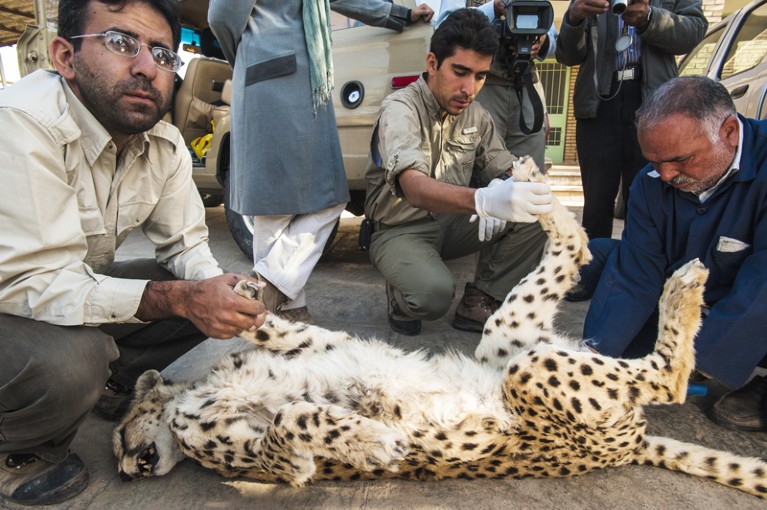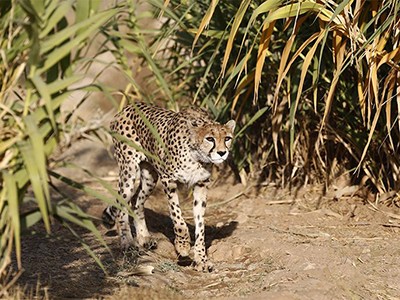
Conservation biologist Amirhossein Khaleghi Hamadi (centre) has been sentenced to six years in prison in Iran.Credit: Frans Lanting/Nat Geo Image Collection
“Sowing corruption on Earth”.
That was one of the charges levelled at Iranian conservation biologists who were arrested in January 2018 and charged with spying. They were arrested for using camera traps to study endangered wildlife, especially the Asiatic cheetah (Acinonyx jubatus venaticus). There are fewer than 100 of the animals left in the world and most are believed to be in Iran.
All the nine researchers charged — Niloufar Bayani, Taher Ghadirian, Amirhossein Khaleghi Hamidi, Houman Jowkar, Sepideh Kashani, Abdolreza Kouhpayeh, Sam Rajabi, Morad Tahbaz and Kavous Seyed Emami — were associated with the Persian Wildlife Heritage Foundation, a well-known Tehran-based wildlife conservation charity that had strong links to international conservation organizations and to the UN Environment Programme.
Emami died in unexplained circumstances in prison shortly after his arrest. The other eight were sentenced last week to between 6 and 10 years in prison, but are strongly protesting their innocence. The trial was held in secret, despite an international outcry from leading conservation charities and pleas from the United Nations for a fair and transparent process.
Conservation groups urge fair trial for jailed Iranian researchers
This tragic verdict came too late for inclusion in Free to Think 2019, an annual report from Scholars at Risk, an international organization that highlights human-rights violations against academic researchers and students. Now in its fifth year, the report records the experiences of scholars who have been subjected to violent or fatal attacks, wrongful prosecution or imprisonment, or who have been sacked or expelled from their institution without undergoing due process.
It isn’t only in Iran that the law is being misused in such a way. The Scholars at Risk report highlights cases of rights violations in 56 countries. This year’s tally of 324 recorded cases between 1 September 2018 and 31 August 2019 is higher than last year’s 294, although the report points out that the examples are just a snapshot of a larger picture.
And there is another emerging phenomenon that has come too late to be highlighted in this year’s study, but is likely to appear in the next. This is the scenes of campus unrest in such diverse locations as Chile, Hong Kong, Iran, Iraq and Lebanon.
Night after night, thousands of young people, as well as their teachers and lecturers, are taking to the streets or — in Hong Kong’s case — have been protesting inside university campuses. Campuses are often places for dissent, but what is happening now is on a scale rarely seen in recent times.
These protests are often in response to a lack of jobs, rising prices, falling living standards, environmental concerns, or concerns about weak, unrepresentative or corrupt political leadership.
The response from university leadership depends on the context. In Iran’s case, speaking out is not an option. In Lebanon, where there is much more academic freedom, students and lecturers have organized informal teach-ins and university presidents are calling on political leaders to heed their students’ demands.
As 2019 gives way to 2020, it is unlikely that campus unrest will abate. There will be pressure from governments on university management not to allow premises to be used for demonstrations. And there will be pressure from the academic community and students not to give in to these, and more draconian, demands.
Researchers and students should not need to live in fear in the pursuit of their science. As this year’s Scholars at Risk report demonstrates, that more are having to do so is a troubling trend.

 Conservation groups urge fair trial for jailed Iranian researchers
Conservation groups urge fair trial for jailed Iranian researchers
 Violent clashes at Hong Kong universities disrupt research
Violent clashes at Hong Kong universities disrupt research
 Chinese American scientists uneasy amid crackdown on foreign influence
Chinese American scientists uneasy amid crackdown on foreign influence
 Indian scientist’s sacking spotlights sexual harassment
Indian scientist’s sacking spotlights sexual harassment







